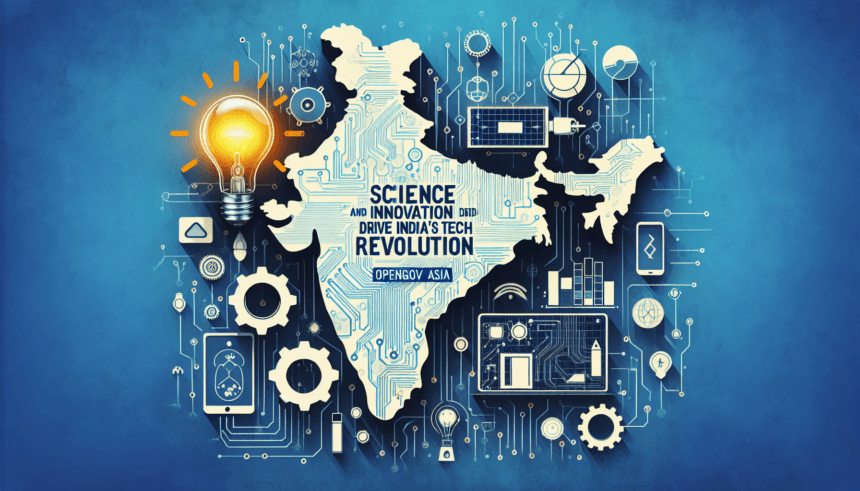Main Points In Hindi (मुख्य बातें – हिंदी में)
-
वैज्ञानिक और प्रौद्योगिकी के क्षेत्र में भारत की भूमिका: केंद्रीय मंत्री डॉ. जितेंद्र सिंह ने भारत की वैश्विक पहचान को बढ़ाने के लिए महत्वाकांक्षी योजनाओं की घोषणा की, जो नवाचार और आत्मनिर्भरता पर केंद्रित हैं।
-
अंतरिक्ष स्टार्टअप के लिए उद्यम पूंजी: सरकार ने अंतरिक्ष स्टार्टअप के लिए ₹1,000 करोड़ (US$120 मिलियन) का उद्यम पूंजी कोष स्थापित करने की योजना बनाई है, जिससे भारत के अंतरिक्ष क्षेत्र में निजी खिलाड़ियों की क्षमता का दोहन किया जा सके।
-
जैव-ई3 नीति: यह नीति "जैव-संचालित" अर्थव्यवस्था को प्रोत्साहित करने का लक्ष्य रखती है, जिसके तहत गैर-नवीकरणीय संसाधनों की निर्भरता को कम करना और सस्टेनिबिलिटी को बढ़ावा देना शामिल है।
-
मौसम पूर्वानुमान मिशन: सरकार ने ‘मिशन मौसम’ का शुभारंभ किया, जिसमें अंतरिक्ष और आईटी का उपयोग करके वास्तविक समय में सटीक मौसम पूर्वानुमान प्रदान करने की योजना है, जिसका लाभ भारतीय किसानों और तटीय समुदायों को होगा।
- वैज्ञानिक एवं तकनीकी एजेंडा: भारत एक ‘सम्पूर्ण-विज्ञान’ दृष्टिकोण को लागू कर रहा है, जिसमें अंतरिक्ष, जैव प्रौद्योगिकी और मौसम विज्ञान को एकीकृत करके विभिन्न क्षेत्रों में अधिकतम प्रभाव डालने का लक्ष्य है।
Main Points In English(मुख्य बातें – अंग्रेज़ी में)
Here are the main points derived from the provided text about India’s initiatives in science and technology:
-
Strengthening India’s Global Role: Union Minister Dr. Jitendra Singh presented ambitious plans by the government to enhance India’s role on the global stage in the field of science and technology, promoting innovation and self-reliance as key focuses.
-
Investment in Space Startups: A significant initiative announced includes the establishment of a venture capital fund of approximately ₹1,000 crore (about US$120 million) aimed at empowering India’s rapidly growing space sector, which has expanded from a handful of startups to around 300. This funding seeks to harness the potential of private players in space exploration.
-
Bio Economy Initiatives: The government is promoting a "bio-based" economy through the Bio E3 policy, which aims to reduce reliance on non-renewable resources while focusing on biotechnology. The strategy includes substituting petroleum-based resources with biofuels and fostering sustainability across various sectors.
-
Mission Weather: The launch of the "Mission Weather" initiative aims to provide real-time and accurate weather forecasts using space and IT solutions. This will assist Indian farmers and coastal communities, and even neighboring countries, with localized predictions to better prepare for weather events.
- Emphasis on Interdisciplinary Collaboration: Dr. Singh highlighted the importance of a holistic scientific approach that integrates areas like space, biotechnology, and meteorology, showcasing India’s commitment to a cohesive strategy for developmental goals. Collaborations, such as the India-Germany science partnership, are strengthening India’s expertise in key fields while promoting the exchange of knowledge.


Complete News In Hindi(पूरी खबर – हिंदी में)
केंद्रीय मंत्री डॉ. जितेंद्र सिंह ने हाल ही में विज्ञान और प्रौद्योगिकी के क्षेत्र में वैश्विक मंच पर भारत की भूमिका को ऊपर उठाने के लिए सरकार की महत्वाकांक्षी योजनाएं पेश कीं। के लिए डिज़ाइन की गई पहल के साथ एक मजबूत तकनीकी पारिस्थितिकी तंत्र को बढ़ावा देना और नवाचार में विश्व नेता के रूप में भारत की स्थिति को बढ़ावा देना, नवाचार और आत्मनिर्भरता पर ध्यान केंद्रित करना है।
घोषित प्रमुख पहलों में से एक अंतरिक्ष स्टार्टअप के लिए लगभग ₹1,000 करोड़ (US$120 मिलियन) उद्यम पूंजी कोष की स्थापना है। कैबिनेट द्वारा अनुमोदित यह फंड भारत के तेजी से बढ़ते अंतरिक्ष क्षेत्र को सशक्त बनाएगा, जो मुट्ठी भर स्टार्टअप से बढ़कर आज लगभग 300 तक पहुंच गया है। इस उद्यम पूंजी समर्थन का उद्देश्य अंतरिक्ष क्षेत्र में निजी खिलाड़ियों की अप्रयुक्त क्षमता का दोहन करना, विकास में तेजी लाना और भारत की अंतरिक्ष अर्थव्यवस्था को बढ़ावा देना है।
चंद्रयान-3 सहित हाल के मिशनों की सफलता ने भारत को वैश्विक पहचान दिलाई है, जो इस क्षेत्र में देश की क्षमता को प्रदर्शित करता है। आगे देखते हुए, भारत का गगनयान मिशन, जो देश का पहला मानव-चालक अंतरिक्ष मिशन होगा, में मानव अंतरिक्ष यात्रियों के अग्रदूत के रूप में रोबोटिक उड़ान के साथ एक अंतिम परीक्षण शामिल होगा – जो अंतरिक्ष अन्वेषण में अग्रणी भूमिका हासिल करने के लिए भारत की प्रतिबद्धता का एक संकेतक है। .
बायो ई3 नीति, जिसका उद्देश्य “जैव-संचालित” अर्थव्यवस्था को बढ़ावा देना है, गैर-नवीकरणीय संसाधनों पर निर्भरता को कम करना चाहती है। यह पहल पर्यावरण, अर्थव्यवस्था और रोजगार के लिए जैव प्रौद्योगिकी (बायो ई3) पर केंद्रित है और भारत की जैव अर्थव्यवस्था रणनीति का केंद्र है। मुख्य लक्ष्यों में पेट्रोलियम-आधारित संसाधनों को जैव ईंधन से बदलना, अपशिष्ट-से-ईंधन समाधान सक्षम करना और सभी क्षेत्रों में स्थिरता को आगे बढ़ाना शामिल है।
भारत के व्यापक प्राकृतिक संसाधन, जिसमें हिमालय के किनारे समृद्ध जैव विविधता और 7,500 किलोमीटर की विशाल तटरेखा शामिल है, देश को इस जैव-अर्थव्यवस्था क्रांति को चलाने के लिए विशिष्ट स्थिति में रखते हैं। यह नीति सतत विकास और एक चक्रीय अर्थव्यवस्था के प्रति सरकार की प्रतिबद्धता को रेखांकित करती है, जिससे आर्थिक विकास होता है जो समावेशी और पर्यावरणीय रूप से जिम्मेदार दोनों है।
सरकार ने मिशन मौसम लॉन्च किया, जो वास्तविक समय, सटीक मौसम पूर्वानुमान प्रदान करने के लिए अंतरिक्ष और आईटी का उपयोग करने वाली एक मौसम संबंधी पहल है। डॉ. सिंह ने कहा कि इसका उद्देश्य भारतीय किसानों, तटीय समुदायों और बांग्लादेश, नेपाल और श्रीलंका जैसे पड़ोसी देशों के लिए हाइपर-स्थानीय भविष्यवाणियां करना है।
डॉ. सिंह ने कहा, “हम केवल मौसम की भविष्यवाणी नहीं कर रहे हैं, हम नागरिकों को मौसम की घटनाओं के निहितार्थ को समझने और उसके अनुसार तैयारी करने में मदद कर रहे हैं।”
उन्नत एआई एप्लिकेशन घंटे-दर-घंटे मौसम की भविष्यवाणी करने में सक्षम होंगे, कृषि क्षेत्र का समर्थन करेंगे और हितधारकों को डेटा-संचालित निर्णय लेने में मदद करेंगे, जिससे लचीलापन और उत्पादकता बढ़ेगी।
डॉ. सिंह ने इस बात पर प्रकाश डाला कि सरकार का वैज्ञानिक और तकनीकी एजेंडा एक व्यापक “संपूर्ण-विज्ञान” दृष्टिकोण को दर्शाता है। अंतरिक्ष, जैव प्रौद्योगिकी और मौसम विज्ञान जैसे विषयों को एकीकृत करके, भारत सभी क्षेत्रों में प्रभाव को अधिकतम करने के उद्देश्य से एक सामंजस्यपूर्ण रणनीति बना रहा है। अंतःविषय सहयोग के प्रति इस प्रतिबद्धता को भारत के व्यापक विकासात्मक लक्ष्यों को साकार करने के लिए आवश्यक माना जाता है।
भारत-जर्मनी विज्ञान साझेदारी इस रणनीति का एक उदाहरण है। 50,000 से अधिक भारतीय शोधकर्ता और छात्र वर्तमान में जर्मनी में उन्नत परियोजनाओं पर काम कर रहे हैं, यह सहयोग जैव प्रौद्योगिकी और नवीकरणीय ऊर्जा जैसे क्षेत्रों में भारत की विशेषज्ञता को मजबूत करता है, नवीन समाधानों को बढ़ावा देता है और ज्ञान के आदान-प्रदान की सुविधा प्रदान करता है।
डॉ. सिंह ने एक आत्मनिर्भर भारत बनाने के लिए सरकार के समर्पण की पुष्टि की जो नवोन्वेषी और विश्व स्तर पर प्रतिस्पर्धी दोनों है। अंतरिक्ष और जैव प्रौद्योगिकी जैसे प्रमुख क्षेत्रों में रणनीतिक रूप से निवेश करके, भारत खुद को लचीलेपन, सरलता और वैज्ञानिक उत्कृष्टता के साथ उभरती चुनौतियों का सामना करने के लिए तैयार कर रहा है।
उन्होंने इस बात पर जोर दिया कि प्रत्येक नीति, फंड और साझेदारी शीर्ष वैश्विक नवप्रवर्तकों के बीच भारत का स्थान सुरक्षित करने और यह सुनिश्चित करने की महत्वाकांक्षा के साथ तैयार की गई है कि विज्ञान के लाभ सीधे जनता तक पहुंचें।
डॉ. सिंह ने कहा, “हमारा लक्ष्य विज्ञान को भारत के लिए काम करने वाला बनाना, हमारी चुनौतियों का समाधान करना, हमारी अर्थव्यवस्था को आगे बढ़ाना और यह सुनिश्चित करना है कि हर सफलता से हमारे नागरिकों को लाभ हो।”
इन लक्षित पहलों के माध्यम से, प्रौद्योगिकी-संचालित भविष्य के लिए भारत का दृष्टिकोण वास्तविकता बन रहा है – जो आर्थिक लचीलापन, सतत विकास और विज्ञान और नवाचार में एक मजबूत वैश्विक स्थिति का वादा करता है।
Complete News In English(पूरी खबर – अंग्रेज़ी में)
Union Minister Dr. Jitendra Singh recently outlined the government’s ambitious plans to enhance India’s role on the global stage in science and technology. The initiatives aim to create a strong technical ecosystem and strengthen India’s position as a leader in innovation and self-reliance.
One of the key initiatives announced is the establishment of a ₹1,000 crore (approximately US$120 million) venture capital fund for space startups. Approved by the Cabinet, this fund aims to empower India’s rapidly growing space sector, which has expanded from just a handful of startups to nearly 300 today. The goal is to tap into the untapped potential of private players in the space industry, accelerate development, and boost India’s space economy.
The success of recent missions, including Chandrayaan-3, has given India global recognition, showcasing the country’s capabilities in this field. Looking ahead, the Gaganyaan mission, India’s first human-crewed space mission, will include a robotic flight as a final test, highlighting India’s commitment to taking a leading role in space exploration.
The Bio E3 policy aims to promote a “bio-driven” economy and reduce reliance on non-renewable resources. This initiative focuses on biotechnology (Bio E3) for environmental, economic, and employment benefits and is central to India’s bio-economy strategy. Key goals include replacing petroleum-based resources with biofuels, enabling waste-to-fuel solutions, and promoting sustainability across all sectors.
India’s abundant natural resources, including rich biodiversity along the Himalayas and a vast 7,500-kilometer coastline, position it uniquely to lead this bio-economy revolution. This policy emphasizes the government’s commitment to sustainable development and a circular economy, fostering economic growth that is inclusive and environmentally responsible.
The government has launched the “Mission Weather,” a meteorological initiative utilizing space and IT to provide real-time, accurate weather forecasts. Dr. Singh mentioned that its aim is to make hyper-local predictions for Indian farmers, coastal communities, and neighboring countries like Bangladesh, Nepal, and Sri Lanka.
Dr. Singh stated, “We are not just predicting the weather; we are helping citizens understand the implications of weather events and prepare accordingly.”
Advanced AI applications will be able to provide hourly weather forecasts, support the agricultural sector, and assist stakeholders in making data-driven decisions, thus enhancing resilience and productivity.
Dr. Singh emphasized that the government’s scientific and technological agenda reflects a comprehensive “whole-science” approach. By integrating subjects like space, biotechnology, and meteorology, India aims to create a harmonious strategy to maximize impact across sectors. This commitment to interdisciplinary collaboration is considered essential for achieving India’s broader developmental goals.
The India-Germany science partnership exemplifies this strategy. Over 50,000 Indian researchers and students are currently working on advanced projects in Germany, strengthening India’s expertise in biotechnology and renewable energy, promoting innovative solutions, and facilitating knowledge exchange.
Dr. Singh reaffirmed the government’s commitment to creating a self-reliant India that is both innovative and globally competitive. By strategically investing in key areas like space and biotechnology, India is preparing to tackle emerging challenges with resilience and scientific excellence.
He stressed that every policy, fund, and partnership is designed with the ambition to secure India’s place among the world’s top innovators and ensure that the benefits of science reach the public directly.
Dr. Singh concluded, “Our goal is to make science work for India, to address our challenges, drive our economy forward, and ensure that every success benefits our citizens.”
Through these targeted initiatives, India’s vision for a technology-driven future is becoming a reality, promising economic resilience, sustainable development, and a strong global position in science and innovation.








